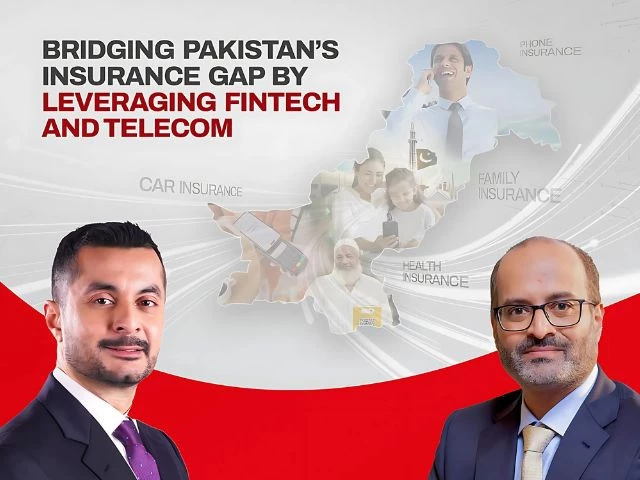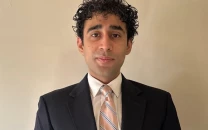Leveraging fintech and telecom to bridge Pakistan’s insurance gap
Pakistan's insurance penetration is just 0.8% of GDP, leaving millions vulnerable to financial shocks

As Pakistan stands at the crossroads of digital transformation, a critical gap in the current financial infrastructure becomes increasingly apparent: our insurance penetration remains just 0.8% of the GDP.
This means millions of Pakistani families are vulnerable to financial shocks from health emergencies, accidents, or loss of life. This vulnerability is further underscored by recent increases in poverty.
The World Bank, in its report titled "Poverty Projections for Pakistan," noted a 25.3 percent poverty rate in 2024, up by 7 percentage points from 2023, pushing an additional 13 million people into poverty. Within this projected increase, poor households face disproportionately higher welfare losses and get pushed deeper into poverty.
Two emerging markets offer compelling insights into insurance sector transformation. India, with its vision of "Insurance for All by 2047," has made significant strides in expanding insurance coverage. While still below the global average, India's life insurance penetration stands at 2.8%, with non-life insurance reaching 1% of GDP. Their insurance regulator, IRDAI, has been instrumental in this growth, implementing innovative strategies such as creating Bima Sugam, a digital platform for insurance that simplifies product selection, and repealing over 1,000 outdated regulations.
Simultaneously, Kenya provides another instructive model. Through mobile-based microinsurance platforms like M-Tiba, the country has dramatically increased insurance access, particularly in rural areas. These digital solutions have enabled millions of low-income Kenyans to access affordable health insurance through mobile technology.
In this global context, we must ask ourselves: what is Pakistan's roadmap to universal insurance coverage, and how can we leverage our growing fintech and digital connectivity ecosystem to achieve this ambitious goal?
The challenges are significant but not insurmountable. In a country where traditional insurance has long been viewed with skepticism and perceived as a luxury rather than a necessity, we need a paradigm shift in how insurance products are designed and distributed. Our current life insurance penetration remains stagnant at 0.5%, with non-life insurance at an even lower 0.3%.
Jazz has been at the forefront of insurtech innovation in Pakistan, with its pioneering efforts playing a crucial role in bridging the insurance gap. Achieving a remarkable milestone of 8.6 million active insurance policies, Jazz has seamlessly integrated insurance into its bundles, offering customers not only affordable GSM benefits but also essential health and handset coverage.
Jazz also offers customized bundles with a built-in component of insurance meeting the specific needs of women's health-related concerns. The digital operator has pioneered several groundbreaking initiatives in the insurance space, particularly through its FikrFree platform, which serves as Pakistan's answer to India's PolicyBazaar.
The FikrFree Insurance and Healthcare Marketplace represents a significant evolution in Pakistan's digital insurance landscape. This comprehensive platform brings together over 30 insurance products from multiple service providers, ranging from health and handset insurance to bike coverage. What sets FikrFree apart is its holistic approach to customer well-being, integrating healthcare services such as e-pharmacy and online video consultations with over 2,000 doctors. The introduction of the FikrFree Sehat Card further demonstrates this commitment, offering retail customers six months of coverage including hospitalization benefits and accidental OPD care.
One particularly innovative aspect of Jazz's insurance strategy is its AI-powered approach to handset insurance, addressing a critical need in a market where phone snatching is a persistent issue. Leveraging Fikrfree AI, the system detects handset changes in real-time and proactively offers tailored insurance offers. Some tariffs even come with built-in handset insurance, covering damage, theft, and screen breakage. This smart protection ensures that customers can quickly recover from device loss or damage without facing significant burden.
Continuing this legacy of innovation, JazzCash as one of the largest embedded insurance distributors in Pakistan, exemplifies the transformative potential of fintech in expanding insurance access.
Currently distributing more than 600,000 policies daily through everyday transactions like digital loans, utility bill payments, and motorway toll top-ups, JazzCash has ambitious plans to help insure 10 million unique lives by the end of 2027 through partners, representing a significant progress towards universal coverage.
One of the most impactful initiatives in this space is JazzCash’s approach to responsible nano-lending. Recognizing that small-ticket loans often target financially vulnerable individuals, JazzCash has pioneered an embedded insurance model that automatically provides free life and health insurance coverage for digital loans above PKR 6,000.
This is significant because a large portion of the 600,000 average daily insurance policies distributed in 2024 were tied to these digital loans. This ensures that in case of an unforeseen event, such as the borrower's death, their family is not burdened with outstanding liabilities. This model not only expands insurance penetration but also sets a new benchmark for responsible lending in Pakistan’s digital financial landscape.
Thanks to initiatives like these, insurance doesn’t have to be about a haggard agent scaring you into buying a premium by listing all the bad things that could happen to you. Now, it can be as easy as a pop-up asking you if you would like to insure your journey for Rs.140 after you pay your toll tax on the motorway.
The path to universal insurance coverage in Pakistan requires addressing several critical challenges. First, we must prioritize financial literacy and insurance awareness. Many Pakistanis remain unaware of insurance benefits or harbor misconceptions about its compatibility with religious beliefs.
In India’s case, life insurance remained a low priority for Indian consumers until the onset of the Covid-19 pandemic. Risk awareness grew during that period, and customers became accustomed to purchasing things digitally. With mobile teledensity at 80% and broadband coverage of around 60%, insurance providers must develop simple products and leverage digital channels to educate and acquire customers.
Second, our regulatory framework must evolve to encourage innovation while ensuring consumer protection. Drawing inspiration from both India's regulatory sandbox approach and Kenya's mobile-first strategy, we can create an environment that fosters insurance innovation. The recent success of micro-insurance products, with premiums as low as Rs. 10 daily, proves that affordability and accessibility can coexist with commercial viability.
Third, we must address our market's unique characteristics. Pakistan needs to leverage its growing digital payment infrastructure and provide both conventional insurance and Takaful options. The availability of Shariah-compliant alternatives is crucial for widespread adoption in our market. Fintech startups and insurance companies must work together to ensure that products are not only accessible but also tailored to meet the diverse needs of consumers, particularly in underserved rural areas.
Murtaza Ali is President of JazzCash and Kazim Mujtaba is President, Consumer Division Jazz.



















COMMENTS
Comments are moderated and generally will be posted if they are on-topic and not abusive.
For more information, please see our Comments FAQ